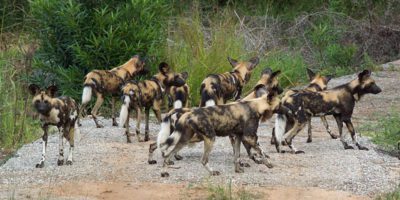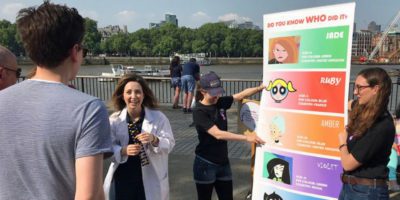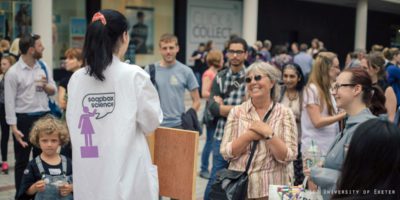Alfiah Rizky Diana Putri is a Ph.D. student at the Mullard Space Science Laboratory, University College London, working on data mining and machine learning on planetary images, focusing on changes over the Martian South Polar Residual Cap. After finishing her undergraduate degree and fast-track master’s degree in electrical engineering, she obtained the Indonesian Endowment Fund of Education to fund her interest in learning about Mars by using orbital images.
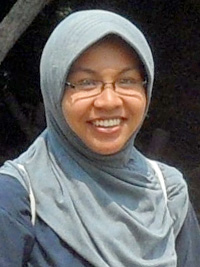
Alfiah is taking part in Soapbox Science Brighton, which takes place on 2nd June 2018 between 11am and 2pm on Brighton Seafront, just west of the i360. The title of her talk is: “Looking for changes on Martian poles with the aid of 3D terrain model”
From electrical engineer to Martian scientist
My career trajectory is not currently that long. I’m a Ph.D. student at the moment. Previously, I took electrical engineering for my undergraduate and master’s degrees, concentrating on signal processing, especially in images.
I’d like to continue to do research in planetary imaging, as I’m interested in space and I had a non-formal education in astronomy and I so applied for a Ph.D. alongside applying for a scholarship. Fortunately, even though it’s not very linear in relation to what I did in my undergraduate and master’s degrees, my sponsor allows me to pursue my interest through my Ph.D.
I chose it for a combination of different reasons – because I like to work with images, and there is a lot of imaging information we have obtained from space. My interest in astronomy was partly brought about by reading Carl Sagan’s books. It’s not a route someone with my background commonly takes, which is actually a bit risky, but I’m up for the challenge! It’s very rewarding so far and hopefully it will continue to be in the future too.
Life observing Mars
In my day to day work, a lot of time is spent in front of the computer. Other than running batch processes in the command line, programming, running planetary software, and using GIS (geographic information system) software to process and show results, we need to prepare the data we’re planning to use.
This includes choosing which data to use based on location, time, type, year (Martian year), and date in Martian year (which is closely related to solar longitude). We project the officially published images to Martian surface. We have more than 500,000 images from Mars from seven different instruments just in the visible wavelength alone, so that’s a lot to choose from!
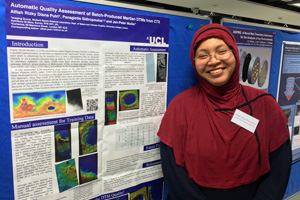
I do a lot of writing – either reports, abstracts, paper drafts, and also emails. To produce high quality scientific writing, it’s important to be able to base them on research with firm foundations, so I also read and cite scientific papers.
Information is power
There is a saying that “information is power”. Data is very valuable, because you can get to make a better decision by better data, not just quantitatively but also qualitatively.
From data you can also infer a lot about something, even though you’re not involved directly with the object or the person in question. Data is very powerful indeed. This also includes personal data, so we have to be careful with our own.
Soapbox Science – an international reputation
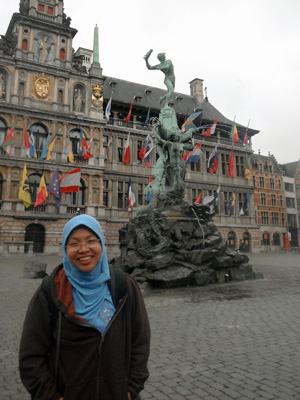
Before I came to study in the UK, I heard about Soapbox Science after I’d read about the events in a science blog. I found the concept very intriguing. As I’m now studying in the UK, when the opportunity arose to get involved, I couldn’t help but say “yes!”. I have ideas on how to attract passers-by to come and discuss science with me without too much scientific jargon, but I’m not sure what will happen in practice!
I also feel that I need to give back because I have been helped, inspired, and supported by a lot of people in order to get where I am today. I haven’t met a lot of people with similar backgrounds working in the same field, so it will be nice to show that the options are there.
Preparing my Soapbox Science talk
I’ll talk a lot about Mars. It will include the way the seasons work on Mars, Martian poles, how to obtain 3D information from Mars and other planets, and interesting features on the planet.
I’m planning to bring Martian maps on fabric, a globe, a model, and pictures. I’m planning to print a 3D model of the Martian south pole using our lab’s 3D printer. I hope the result will be good and helpful for the talk. For the talk itself, other than preparing the structure, I’m also doing some more reading so that I can explain more and answer the more challenging questions.
If you have time, please come to the Soapbox Science event in Brighton on 2nd June to find out more – I’d love to meet you! – or you can contact me after the date too if you’re interested in learning more about my work.
Diversity makes science better
I believe diversity of thought in science is important because a lot of what we do as scientists will turn out as real-world applications.
We can have a hands-free sensor which doesn’t work for different coloured skins, an automatic door which doesn’t work for people in wheelchairs, as well as agricultural solutions for farmers which they hate to use as they’re impractical. If we include more diverse groups of people, especially from the earlier stage, these kinds of accidents will be reduced.
Advice for girls and women interested in careers in science
Everyone is different, but my advice would be to start by contacting people close to you. A lot of people I know shared their interest with their parents or their science teacher. I guess this will be easier if you’re surrounded by positive role models and supportive people. Friends with similar interest will be a good source of support too.
Being proactive is also key. Nowadays you have the Internet in your hand. You can start by learning from the Internet and books. You can have direct contact with a lot of scientists using social media. You can start your science experiments at home. You can also look for opportunities for competitions or science visits. There is sadly a lot of information that’s only available for people “in-the-know”, so if you need to find a way in by being more proactive. (Let’s be more proactive – I’m still trying myself!)
Also, you don’t need to be ‘brilliant’ at science to pursue an interest in it but getting a good foundation in science subjects at school will be very helpful, especially if you’re planning to go on to higher education. Read what you need to take for getting the career you want and choose your subject options carefully.
I was actually a little bit envious of the opportunities available in the UK for students from a young age, even though there can and should be more of them. Also, there are a lot of opportunities, so if you failed in one, maybe you’ll get the next one, please don’t stop trying!
Coming up
As I reach my final year, I am currently finishing my thesis. Hopefully, it can be finished in time. I’ll always talk about Mars, planetary science, or topics about which I’m knowledgeable when I have the opportunity and someone is willing to listen!
I don’t have a fixed plan ahead of that, but if there are opportunities to continue working as academics and or fields related to planetary science especially planetary imaging, I’d definitely like to pursue them.
http://soapboxscience.org/soapbox-science-2018-brighton/
https://www.ucl.ac.uk/mssl/imaging/people/kiky
https://twitter.com/alfiahrizkydp
https://www.facebook.com/alfiah.rizky


